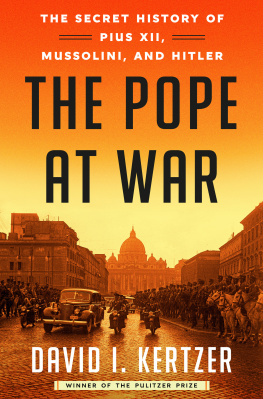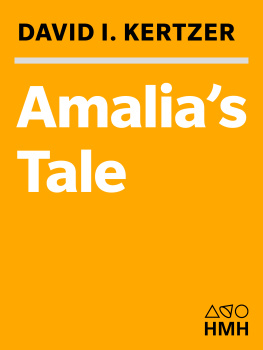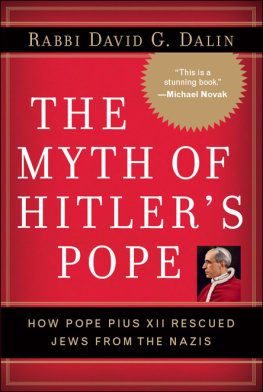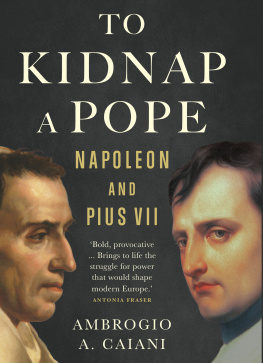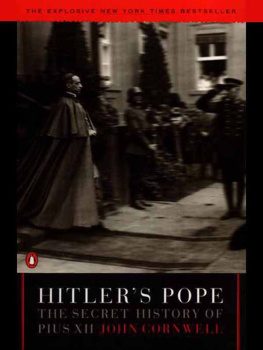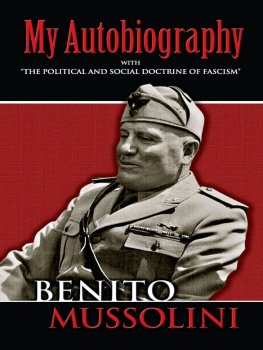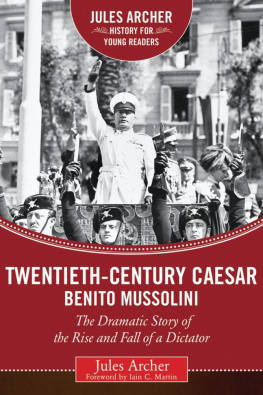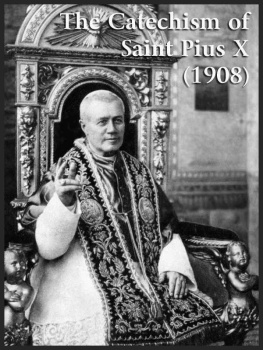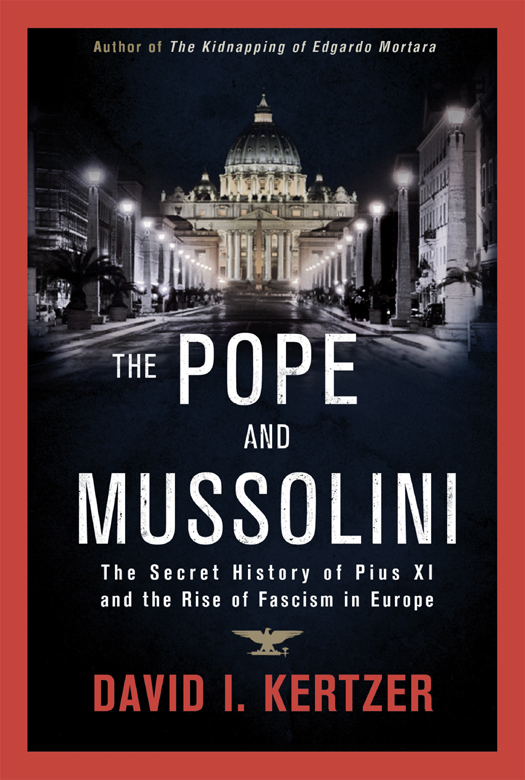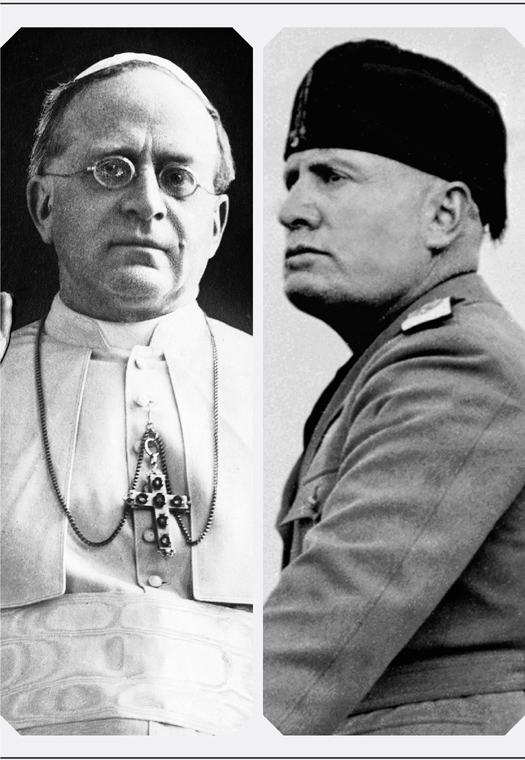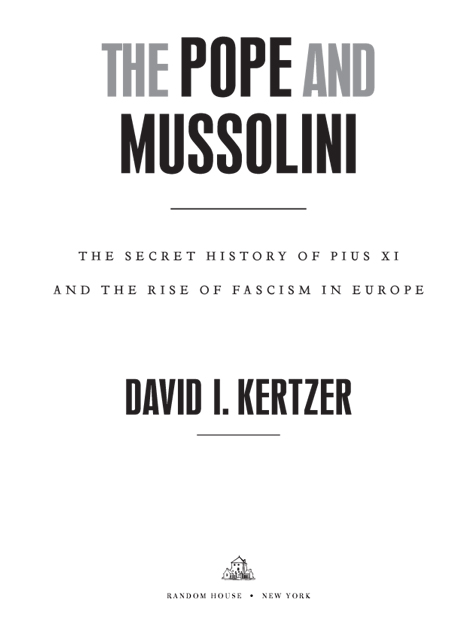Copyright 2014 by David I. Kertzer
All rights reserved.
Published in the United States by Random House, an imprint and division of Random House LLC, a Penguin Random House Company, New York.
R ANDOM H OUSE and the H OUSE colophon are registered trademarks of Random House LLC.
Kertzer, David I.
The Pope and Mussolini : the secret history of Pius XI and the rise of
Fascism in Europe / David I. Kertzer.
pages cm
Includes bibliographical references.
ISBN 978-0-8129-9346-2
eBook ISBN 978-0-679-64553-5
1. Pius XI, Pope, 18571939. 2. Mussolini, Benito, 18831945.
3. Fascism and the Catholic ChurchItaly I. Title.
BX1377.K47 2014 322.1094509042dc23 2013019402
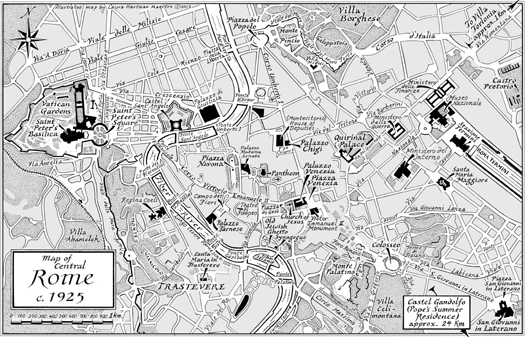
To view a full-size version of this image, click HERE.
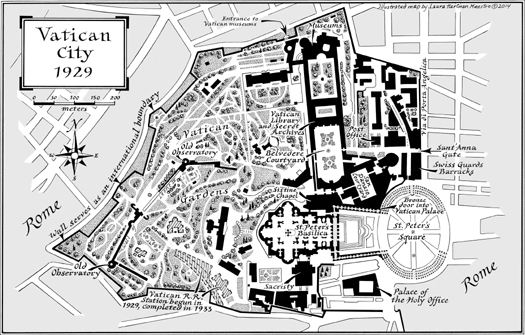
To view a full-size version of this image, click HERE.
CAST OF CHARACTERS
BALBO, ITALO (18961940) The swashbuckling Fascist boss of the city of Ferrara, Balbo was one of the leaders of the 1922 March on Rome. President Roosevelt awarded Balbo a Distinguished Flying Cross in 1933 when he led an expedition of twenty-four seaplanes to the United States. While his aerial heroics won him great popularity on both sides of the Atlantic, they sparked Mussolinis jealousy.
POPE BENEDICT XV (GIACOMO DELLA CHIESA) (18541922) Born to an aristocratic family in Genoa, Giacomo Della Chiesa rose to become archbishop of Bologna in 1913. Despite his nonpapal appearance, he was elected to succeed Pius X in 1914. He dismantled his predecessors fierce antimodernist crusade and clerical spy force but failed in his efforts to play an effective role as peacemaker during and after the Great War.
BAUDRILLART, ALFRED (18591942) Catholic scholar and longtime head of the Catholic University of Paris, Baudrillart was named a bishop in 1921 and a cardinal in 1935. Keeper of a precious diary, Baudrillart worried over the intrigue surrounding the ailing Pope Pius XI as Mussolini solidified his alliance with Hitler.
BORGONGINI-DUCA, FRANCESCO (18841954) Born in Rome, Borgongini was appointed in 1921 to be secretary of the Congregation of Extraordinary Ecclesiastical Affairs, one of two key positions under the Vatican secretary of state. There he dealt with international affairs despite never having lived outside Rome. In 1929 Pius XI named him the Vaticans first nuncio or ambassador to Italy, a position he would occupy for over two decades. Devout and unworldly, Borgongini was an irresistible target for Mussolinis teasing.
BUFFARINI GUIDI, GUIDO (18951945) Elected Fascist mayor of Pisa in 1923 at age twenty-eight, Buffarini became Mussolinis undersecretary for internal affairs ten years later, responsible for the national police. A corrupt, fat bully, he took on ever greater power in the late 1930s, freeing Mussolini to focus on expanding his newly acquired Italian empire.
CACCIA DOMINIONI, CAMILLO (18771946) Appointed prefect of the papal household by Benedict XV in 1921, Caccia had known Achille Ratti when he and the future pope were in Milan earlier in the century. Kept on by Pius XI, charged with organizing his daily schedule and determining who would get to see him, he stood at the popes side every day. Caccia had a terrible secret, widely known in the Vatican and among the Fascist police, that threatened him with disgrace.
CERRETTI, BONAVENTURA (18721933) One of the Vaticans leading diplomats, Cerretti was papal nuncio to France when Pius XI appointed him cardinal in 1926. A critic of the popes partnership with Mussolini, he was further angered when Pius XI passed him over and named a rival as secretary of state in 1930.
CIANO, GALEAZZO (19031944) Son of a government minister, Ciano married Mussolinis eldest daughter, Edda, in 1930. A self-styled ladies man, intensely disliked by Mussolinis wife, he quickly became his father-in-laws heir apparent, much to the dismay of the other Fascist leaders. After Ciano served a brief stint as minister of press and propaganda, Mussolini shocked the diplomatic world by appointing him minister of foreign affairs in 1936.
COUGHLIN, CHARLES (18911979) Born and ordained a Catholic priest in Canada, Coughlin used his parish in Detroit to broadcast a radio program that reached tens of millions of Americans in the 1930s. Initially a supporter of Franklin Roosevelt and social reform, he turned sharply rightward, accusing the president of being a Communist agent. An apologist for Hitlers crusade against the Jews, Coughlin was also eager to be of service to the Italian dictator.
DE VECCHI, CESARE (18841959) A monarchist from Turin, De Vecchi was one of the four leaders of the March on Rome. He served as Italys first ambassador to the Holy See from 1929 to 1935. Arrogant, petty, thickheaded, and easily recognizable by his outlandish mustache, he was the object of much ridicule, not least by Mussolini. Although De Vecchi suffered through many of Pius XIs table-pounding tantrums, the pope ended up viewing him with some affection.
GASPARRI, PIETRO (18521934) Child of a poor family of mountain shepherds in central Italy, Gasparri became a scholar of canon law and one of the Vaticans most influential diplomats. As secretary of state first under Pope Benedict XV and then under Pius XI, the short, rotund Gasparri disguised his sharp political sense beneath a show of gregarious good humor.
GRING, HERMANN (18931946) One of the Nazi leaders closest to Hitler, he founded the Gestapo and held many top government positions in Nazi Germany. Mussolini at first dismissed him as a lunatic.
GRANDI, DINO (18951988) Undersecretary of the interior and then, from 1929 to 1932, Mussolinis minister of foreign affairs. The goateed Grandi was initially among the most radical of the Fascists. But the life of Italian ambassador in London (193239) agreed with him and would affect his view of Mussolinis increasing embrace of Nazi Germany.


